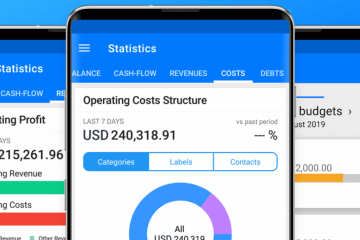How To Set Your Business Goals (and Achieve Them!)
A business is only as good as its goals.
As you look to grow your business, setting goals can help you grow, take necessary risks, and make changes that affect your bottom line. That’s why you need to learn not only how to set your business goals, but how to achieve them.
In this article, we’ll cover:
- Your business’ evolving goals
- Setting strategic goals for the future
- Crafting meaningful milestones along the way
Your Changing Business Goals
Depending on the stage your business is in, your goals are going to change accordingly. Let’s look at it like this, depending on where you are at here is how your goals may change:
- An Idea – Your goal may simply be to gain funding to grow your business.
- A Startup – Now that you have the funding you not only need more, but you need to provide a product or service to eventually turn a profit.
- Scaling Up – As your business grows, your goals may be to introduce new revenue streams or product offerings to grow your suite with your business.
- Mature Business – Your business may be aging, but your goal remains the same: to do more and more to increase revenue and optimize your offerings.
The fact is that we need to look at business goals as “living goals.” This means that they are always changing, and if they remain static that may be an issue. If your goal is forever to simply get funding, maybe your idea is suffering and needs to be improved.
Your goals will grow with your business, and they will often reflect the next step to becoming better and better at what you do. In terms of setting those goals, though, realizing that they will change is often the first step.
If we recognize that your goals are often in flux, we need to take a strategic approach to help benefit your business by executing them.
Setting Strategic Business Goals
Essentially, your business goals are going to fall into two distinct camps:
- Strategic
- Financial
Strategic Goals
Think of your strategic goals as some of your more ambitious offerings and stages in the growth of your business. This could be something like a product launch, market-entry, or a marketing campaign of some kind).
Ultimately, these are some of the more “conceptual” goals that are going to help power your business’ creative impetus. What you are offering, how you are offering it, and how it will grow alongside your balance sheet.
Financial Goals
On the other hand, your financial goals are going to focus on more of the hard details – apart from your strategic goals. While they will influence one another, your financial goals are going to be more detail-oriented than conceptual.
This would include optimizing your cash flow, your return on investment, or working toward maximum profitability within your company. All of the things that will be buoyed by your strategic goals, these are the financial outcomes you will work toward.
Choosing The Right Goals
The main thing to remember is that strategic and financial goals are not completely separate – while you should plan for them separately, they have a direct effect on one another.
Instead, consider how your strategic goals are going to have an effect on your financial goals. Think about your goals in terms of a best-case and worst-case scenario, and go from there.
When you are able to separate your conceptual goals from your detailed goals, though, you can keep a better idea of which ones take priority and the relationship that exists between them.
Embrace Using Milestones
One of the most important things you can do with your goals, whether strategic or financial, is to associate them with distinct milestones.
Milestones help ensure that your goals are not only achieved but that they are measurable – whether in terms of days, weeks, months, or years.
Think of it like this, if you are setting up your initial business plan you might want to think in terms of quarterly or yearly results.
A business that is older, though, may want to set goals alongside its budget to help track certain performance indicators and the financial results of certain strategic accomplishments.
Taken together, milestones offer the opportunity to measure your success against a timeline and to determine whether your goals are not only feasible but successful.
Using Board to Reach Your Goals
The strength of your business’ goals is going to be determined by your financial performance – it’s the way you grow, gain more funding, and become successful.
That’s why we created Board, to give small business owners the opportunity they needed to make sense of their finances. Not only to keep track of things but to provide real, actionable insight that makes sense with your goals.
With Board by your side, you have the chance to manage growth, liquidity, and profitability, all in ways that can help ensure you are setting goals and milestones that make sense.
Interested in learning more? Discover some of the benefits of working with Board today or sign up today with the WebApp. Or find the app on the App Store or Google play.


